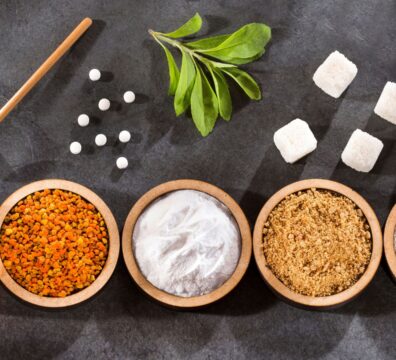Résumé rapide
Les édulcorants artificiels tels que le sucralose et l'aspartame sont présentés comme des substituts du sucre sûrs et sans calories. Mais de nouvelles recherches suggèrent qu'ils peuvent augmenter le stress oxydatif, perturber les hormones et réduire la consommation d'alcool. qualité du sperme - mettre en péril la fertilité masculine.
Que sont les édulcorants artificiels et sont-ils vraiment sûrs ?
Les édulcorants artificiels tels que le sucralose, l'aspartame et l'acésulfame K sont largement utilisés dans les produits sans sucre. Ces composés synthétiques procurent un goût sucré intense avec peu ou pas de calories et leur utilisation est approuvée dans l'UE et dans d'autres régions.
Cependant, de nouvelles recherches soulèvent des inquiétudes. Des études suggèrent que même à faible dose, les édulcorants artificiels peuvent :
- Perturber le microbiote intestinal
- Favoriser l'inflammation et la résistance à l'insuline
- Déclencher une augmentation de l'appétit et des fringales
- Interférer avec la régulation hormonale
Ces effets peuvent avoir un impact non seulement sur la santé métabolique, mais aussi sur la fonction de reproduction, en particulier chez les hommes.
Les édulcorants artificiels peuvent-ils affecter la fertilité masculine ?
Oui, de nouvelles données suggèrent que c'est possible. Une étude récente publiée dans Perspectives en matière de santé environnementale a montré que le sucralose peut altérer des aspects clés de la santé reproductive masculine, même à des niveaux autrefois considérés comme sûrs.
Des recherches en laboratoire ont montré que l'exposition au sucralose avait les effets suivants :
- Augmentation du stress oxydatif dans les testicules
- Réduire la production de testostérone
- Diminution de la concentration et de la mobilité des spermatozoïdes
- Inhiber les systèmes de défense cellulaire comme l'autophagie
Ces effets peuvent compromettre l'équilibre hormonal, le développement des spermatozoïdes et, en fin de compte, la fertilité masculine.
Qu'est-ce que le stress oxydatif et pourquoi est-il important ?
Le stress oxydatif survient lorsque les radicaux libres dépassent les défenses antioxydantes naturelles de l'organisme. Cela provoque des dommages cellulaires, en particulier dans les tissus délicats comme ceux du système reproducteur masculin.
Les dommages causés à ces cellules peuvent entraîner une diminution du nombre de spermatozoïdes, une réduction de leur mobilité et une altération du potentiel de fécondation.
Comment protéger votre fertilité des édulcorants ?
La protection de la fertilité masculine commence par des mesures informées et proactives :
- Limiter les édulcorants artificiels au quotidien
- Adopter un régime alimentaire riche en nutriments et en antioxydants
- Compléter avec des antioxydants clés pour lutter contre le stress oxydatif
Un supplément scientifiquement formulé comme Fertilovit® Mplus offre un soutien ciblé. Il contient :
- Coenzyme Q10 - aide à dynamiser les cellules et à réduire les dommages oxydatifs
- Sélénium et zinc - essentiels à la formation des spermatozoïdes et à l'équilibre hormonal
- Vitamines C et E - antioxydants puissants qui aident à protéger l'ADN des spermatozoïdes
Ensemble, ces nutriments favorisent un taux de testostérone sain, améliorent la qualité du sperme et aident à défendre les cellules reproductrices contre le stress et le vieillissement.
Dernière réflexion : Sans sucre ≠ Sans risque
Ce n'est pas parce qu'un produit est sans sucre qu'il est sans danger, surtout lorsqu'il s'agit de votre santé reproductive.
Si vous envisagez de fonder une famille ou si vous souhaitez simplement protéger votre fertilité à long terme, il est temps de le faire :
- Repensez votre consommation quotidienne d'édulcorants artificiels
- Soutenez votre corps avec des nutriments axés sur la fertilité
- Choisissez des habitudes qui favorisent réellement l'équilibre hormonal et la protection des cellules
Votre fertilité vaut la peine d'être protégée - et cela commence par des choix quotidiens.
FAQ - Fertilité et édulcorants
Les édulcorants affectent-ils la fertilité masculine ?
Oui. La recherche montre que les édulcorants comme le sucralose peuvent augmenter le stress oxydatif et réduire la concentration et la motilité des spermatozoïdes ainsi que la production de testostérone.
Qu'est-ce que le stress oxydatif et comment nuit-il à la fertilité ?
Le stress oxydatif désigne les dommages cellulaires causés par une surcharge de radicaux libres. Dans les testicules, il nuit au bon développement des spermatozoïdes.
Comment puis-je soutenir ma fertilité de manière naturelle ?
En réduisant la consommation d'édulcorants artificiels, en suivant un régime alimentaire équilibré et en prenant des suppléments d'antioxydants tels que le CoQ10, le sélénium, le zinc et les vitamines C et E.
Clause de non-responsabilité : Cet article est publié à des fins éducatives uniquement et ne remplace pas un avis médical. Veuillez consulter un fournisseur de soins de santé qualifié pour obtenir des conseils personnalisés.
Référence
Chiang YF, Chen YC, Huang KC, Ali M, Hsia SM. L'exposition au sucralose et ses effets sur les lésions testiculaires et l'infertilité masculine : Insights into Oxidative Stress and Autophagy. Environ Health Perspect. 2025 May 16. doi : 10.1289/EHP15919. Epub ahead of print. PMID : 40378307.
Harrington V, Lau L, Crits-Christoph A, Suez J. Interactions of Non-Nutritive Artificial Sweeteners with the Microbiome in Metabolic Syndrome. Immunometabolism. 2022;4(2):e220012. doi : 10.20900/immunometab20220012. Epub 2022 Apr 18. PMID : 35528135 ; PMCID : PMC9075537.
Suez J, Korem T, Zilberman-Schapira G, Segal E, Elinav E. Non-caloric artificial sweeteners and the microbiome : findings and challenges. Gut Microbes. 2015;6(2):149-55. doi : 10.1080/19490976.2015.1017700. Epub 2015 Apr 1. PMID : 25831243 ; PMCID : PMC4615743.

